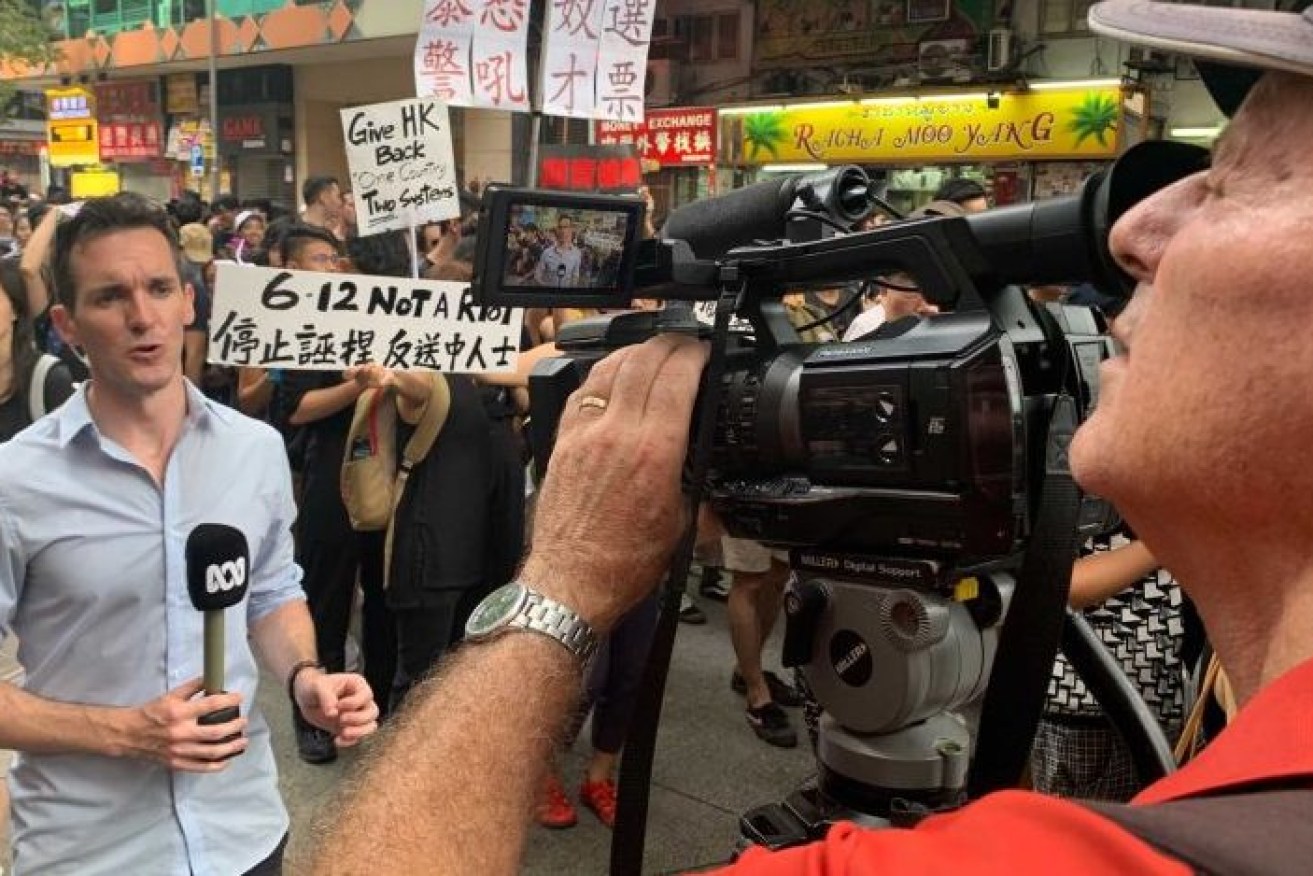Last two Aussie journalists rushed out of China over ‘threatening behaviour’
The final two Australian journalists working in China have been rushed out of the country over safety concerns.

ABC Beijing correspondent Bill Birtles, one of two Australian journalists to have been rushed out of China over threatening behaviour. (Photo: ABC)
Bill Birtles from the ABC and Michael Smith from the Australian Financial Review were evacuated from China after local police demanded interviews with them.
The men sheltered in Australian diplomatic compounds for several days as consular officials worked to get them out.
They touched down in Sydney on Tuesday morning.

Michael Smith (left) and Bill Birtles as they were departing China. (Photo: ABC photo)
“The ABC has brought back China correspondent Bill Birtles to Australia following advice from the Australian government,” a spokeswoman told AAP.
Birtles, the ABC’s correspondent based in Beijing, and Smith, the AFR’s correspondent based in Shanghai, boarded a flight to Sydney last night after the pair were questioned separately by China’s Ministry of State security.
Birtles had spent four days sheltering in Australia’s Embassy in Beijing, while Smith took refuge in Australia’s Shanghai consulate as diplomats negotiated with Chinese officials to allow them to safely leave the country.
The saga began early last week, when Australian diplomats in Beijing cautioned Birtles that he should leave China, with officials from the Department of Foreign Affairs and Trade giving the same advice to ABC’s managing director David Anderson in Sydney.
The advice prompted the ABC to organise flights back to Australia for Birtles. He was due to depart last Thursday morning.
But the threatening behaviour from Chinese officials peaked before he could leave, when seven police officers arrived at Birtles’ apartment at midnight last Wednesday as he was holding farewell drinks with friends and colleagues.
They told him he was banned from leaving the country, and that he would be contacted the next day to organise a time to be questioned over a “national security case”.
Birtles called the Australian Embassy and arranged to be collected from his apartment. He stayed in the Beijing diplomatic compound for the next week, where he was contacted by Chinese officials demanding an interview.
He refused to speak with them, citing fears for his personal safety.
He is not suspected of anything by Chinese authorities.
Birtles was interviewed by Chinese authorities on Sunday, accompanied by Australia’s ambassador to China Graham Fletcher, after an agreement was reached between Australian and Chinese officials that his travel ban would be lifted if he spoke to them.
During the meeting, no questions were asked about his reporting or conduct in China.
Smith was interviewed by authorities yesterday. He said it was great to be home.
“The late-night visit by police at my home was intimidating and unnecessary and highlights the pressure all foreign journalists are under in China right now,” he told the AFR.
Birtles was told by embassy officials after the interview that his travel ban had been rescinded. He was joined by consular staff on a flight from Beijing to Shanghai early on Monday, where he waited for his flight to Sydney.
AFR’s correspondent Smith was subjected to questioning on Monday evening, after sheltering in the Australian consulate in Shanghai. The AFR made similar arrangements to get him out of the country.
The drama came only days after China’s Government publicly confirmed the arrest of an Australian journalist working for China’s state media, Cheng Lei.
The unprecedented standoff marks another deterioration in the Australia-China relationship, already buffeted by tensions over trade, espionage, Hong Kong and the coronavirus pandemic.
In July, the Australian Government changed its travel advice for China, warning Australian citizens faced “arbitrary detention” on the mainland.
Anderson has been in contact with DFAT and Foreign Minister Marise Payne’s office since the initial warning was issued last week.
ABC News director Gaven Morris said Birtles was being brought home following advice from the Australian Government.
“This bureau is a vital part of the ABC’s international newsgathering effort and we aim to get back there as soon as possible,” Morris said in a statement.
“The story of China, its relationship with Australia and its role in our region and in the world is one of great importance for all Australians and we want to continue having our people on the ground to cover it.”
The evacuation means for the first time since the mid-1970s there are no accredited Australian media journalists in China, with correspondent for The Australian Will Glasgow also out of the country.
China has not issued new visas for journalists from the ABC and Nine Newspapers.
The move against Birtles and Smith comes in the wake of a broader crackdown on Western journalists in China.
In March, Beijing expelled 14 American journalists working at The New York Times, The Wall Street Journal and The Washington Post in retaliation for the Trump Administration’s decision to restrict staff at Chinese state media outlets in the United States.
The ABC’s Beijing bureau opened in 1973, shortly after Australia normalised relations with China under prime minister Gough Whitlam.
ABC correspondents have been witnesses to a variety of major international stories from the bureau, including the Tiananmen Square massacre, the 2008 Olympics, pro-democracy protests in Hong Kong and the coronavirus outbreak.
Run-ins with Chinese authorities have been regular and frequent, with a number of correspondents being questioned by authorities while pursuing stories.
-AAP, ABC












